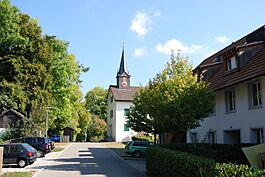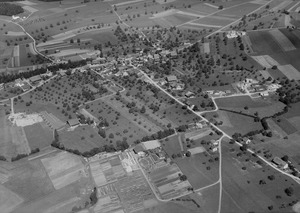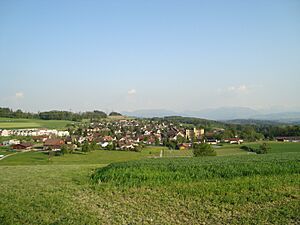Arni, Aargau facts for kids
Quick facts for kids
Arni
|
||
|---|---|---|
 |
||
|
||
| Country | Switzerland | |
| Canton | Aargau | |
| District | Bremgarten | |
| Area | ||
| • Total | 3.37 km2 (1.30 sq mi) | |
| Elevation | 568 m (1,864 ft) | |
| Population
(Dec 2020 )
|
||
| • Total | 1,888 | |
| • Density | 560.2/km2 (1,451.0/sq mi) | |
| Postal code |
8905
|
|
| Surrounded by | Aesch bei Birmensdorf (ZH), Hedingen (ZH), Islisberg, Jonen, Oberlunkhofen, Oberwil-Lieli, Unterlunkhofen | |
Arni is a small town, also called a municipality, in Switzerland. It is located in the Bremgarten district within the canton of Aargau.
Contents
History of Arni
Arni was first mentioned in old records in the year 1184. Back then, its name was Arne.
In 1983, a nearby village called Islisberg decided to become its own separate municipality. Before that, Arni and Islisberg were part of one larger municipality called Arni-Islisberg. After the split, Arni became its own municipality, known as Arni, AG.
Geography of Arni
Arni covers an area of about 3.4 square kilometers (which is about 1.3 square miles). A big part of this land, almost 59%, is used for farming. Forests cover about 28% of the area.
About 12% of Arni's land has buildings or roads on it. The rest, less than 1%, is made up of things like rivers or lakes. The town is located in the Bremgarten district. It sits on the southern edge of a hill range called the Heitersberg. Arni is about 568 meters (1,864 feet) above sea level.
Arni's Coat of Arms
The coat of arms for Arni has a special design. It is split into two parts. The top part is gold and shows a red lion walking. The bottom part is blue and has a silver key lying sideways. This key has two sets of teeth on its left side.
People of Arni (Demographics)
Arni has a population of about 1,888 people. In 2008, about 12% of the people living in Arni were from other countries. Over the ten years before that, the number of people living in Arni grew by almost 30%.
Most people in Arni speak German, about 95% of the population. A smaller number of people speak French (about 1.3%) or Italian (about 0.9%).
In 2008, about 11.6% of the population were children aged 0 to 9 years old. Teenagers, aged 10 to 19, made up about 13.5% of the population.
Most homes in Arni are owned by the people who live in them. This means they don't pay rent. In 2008, there were 347 single-family homes in Arni. This was about 56.5% of all the homes and apartments in the town.
In the 2007 national election, the most popular political party in Arni was the SVP. They received about 38% of the votes.
People in Switzerland are generally well-educated. In Arni, about 87% of adults (aged 25-64) have finished high school or gone on to higher education, like university. In the 2008/2009 school year, 121 students attended primary school in Arni.
Here is how Arni's population has changed over time:
| Historical population | ||
|---|---|---|
| Year | Pop. | ±% |
| 1850 | 432 | — |
| 1900 | 434 | +0.5% |
| 1950 | 397 | −8.5% |
| 1975 | 711 | +79.1% |
| 1980 | 667 | −6.2% |
| 1990 | 966 | +44.8% |
| 2000 | 1,302 | +34.8% |
Economy of Arni
In 2007, Arni had a low unemployment rate of about 1.6%. This means most people who wanted a job had one.
The economy of Arni is divided into three main parts:
- Primary sector: This includes jobs like farming. In 2005, about 22 people worked in this area.
- Secondary sector: This involves manufacturing and construction. About 85 people worked in these jobs.
- Tertiary sector: This covers services, like shops and offices. About 87 people worked in this sector.
In 2000, many people who lived in Arni worked outside the municipality. About 83% of residents traveled to other places for their jobs. However, 71 people came into Arni to work. There were 198 jobs available in Arni itself.
About 23% of working people used public transportation to get to their jobs. More than half, about 53%, used a private car.
Religion in Arni
Based on information from the year 2000, about 41.6% of the people in Arni were Roman Catholic. Another 34.3% belonged to the Swiss Reformed Church.
See also
 In Spanish: Arni (Argovia) para niños
In Spanish: Arni (Argovia) para niños
 | Sharif Bey |
 | Hale Woodruff |
 | Richmond Barthé |
 | Purvis Young |






